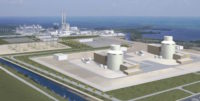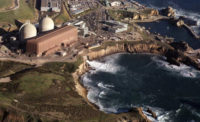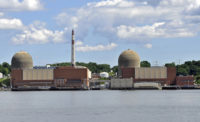Takedown of the defunct 860-MW Crystal River nuclear plant in Florida now begins with final agreement reached Oct. 1 on the $540-million contract between owner Duke Energy and contractor Accelerated Decommissioning Partners initially signed last year.
Work will be done under the U.S. Nuclear Regulatory Commission's immediate dismantling protocol that allows structures and equipment with nuclear contamination to be removed before radioactivity has time to decay.
The utility originally planned in 2015 to defer decommissioning for 60 years to allow that decay under NRC’s SAFSTOR protocol, which also enables the site's NRC-mandated trust fund to build financial reserves to pay for the work.
But as competition in the nuclear decommissioning sector drove prices down, Duke determined that the fast-track process could be done within the budget of the $711-million trust fund, Heather Danenhower, company communications manager, told ENR.
The plant is located in Citrus County, Fla., about 85 miles north of Tampa.
Accelerated Decommissioning Partners, a joint venture of NorthStar Group Services and Orano USA, was selected in 2019 after four companies responded to a 2018 request for proposals.
NRC approved transfer of the plant’s operating license in April and the Florida Public Service Commission approved the contract award transaction in late August, followed by a 30-day appeals window that closed Sept. 28, Danenhower said.
Decommissioning should be completed by 2027. Initial decommissioning will focus on removing radioactive contaminants before full-scale site demolition.
Duke Energy retains ownership of the plant and expects its 1,000-acre site to be reduced to two acres in 2026 when a partial license termination is expected and only dry-cask storage of nuclear materials remains. After the dry-cask stored materials are removed from site, possibly by 2038, money remaining in the trust fund will return to ratepayers.
The utility has not decided what the site will be used for, but the surrounding area is industrial and includes coal- and gas-fired generation and a retired coal-fired plants, Danenhower said.
Planning and engineering will continue through 2021 with some smaller ancillary facilities taken down. “We believe decommissioning as early as possible makes sense,” said Scott State, CEO of the C&D firm. “Obsolete generating facilities pose certain hazards if left standing.”
Duke acquired the Crystal River nuclear plant after merging with Progress Energy in 2012 and opted not to restart the unit after it was damaged in 2009 during a refueling outage and steam generator replacement.
NextEra Energy, which owns utility Florida Power & Light, the country’s largest regulated utility, was rebuffed in its offer to take over Duke Energy in what would have created an estimated $45-billion-revenue giant, the Wall Street Journal said Sept. 29.
NextEra could pursue a hostile takeover, but that is rare in the utility business because of the regulated nature of the industry, said Paul Patterson, a power sector financial analyst at Glenrock Associates.
“NextEra is looking to make utility acquisitions, but it has not been successful,” he added. The company has unsuccessfully pursued Hawaiian Electric, Oncor Electric Delivery and Constellation Energy.
A Duke Energy spokesman said the company does not comment on rumors and speculation.






Post a comment to this article
Report Abusive Comment